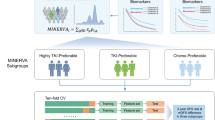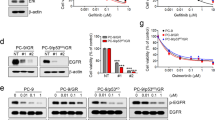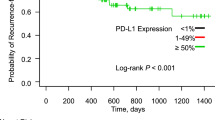Abstract
The objective of this study was to analyze the predictive roles of VEGF/KDR/Ras/MAPK gene expression in patients with advanced non-small-cell lung cancer (NSCLC) treated with bevacizumab plus chemotherapy. Twenty-five patients participating in an open-label phase IV trial (SAiL, MO19390) with available tumor tissues were analyzed. The mRNA expression levels of VEGF, kinase insert domain receptor (KDR), Ras, and mitogen-activated protein kinase (MAPK) in tumor tissues were detected using real-time quantitative PCR methods. The relationships between gene expression and disease control rate (DCR), progression-free survival (PFS), and overall survival (OS) were assessed. Patients with lower Ras expression had a longer PFS and OS than patients with higher expression (median PFS, 9.9 vs 5.5 months, χ2=3.944, P=0.047; OS, 19.3 vs 7.1 months, χ2=9.384, P=0.002). The PFS and OS of patients with lower and higher MAPK expression exhibited a marginal and significant difference (median PFS, 9.9 vs 5.5 months, χ2=3.464, P=0.063; OS, 19.3 vs 9.7 months, χ2=5.298, P=0.021), respectively. Multivariate analyses using Cox’s proportional hazards model showed that Ras is an independent predictor of OS (χ2=9.384, P=0.002). No differences in DCR were found according to Ras expression level. The results indicate that Ras is an independent predictor of OS. Thus, patients with lower Ras expression are most likely to benefit from bevacizumab plus chemotherapy treatment regimen. Patients with higher levels of Ras should receive other inhibitors that target Ras. The results also suggest that gene therapies that decrease RAS expression combined with bevacizumab may improve lung cancer treatment. Although there is a very important implication to patient selection in the target therapy, the data in this study are very preliminary owing to the too small sample size. Therefore, further research involving large numbers of patients and a prospective assessment of low and high RAS mRNA expressions getting the same treatments need to be done before conclusions can be made.
This is a preview of subscription content, access via your institution
Access options
Subscribe to this journal
Receive 12 print issues and online access
$259.00 per year
only $21.58 per issue
Buy this article
- Purchase on Springer Link
- Instant access to full article PDF
Prices may be subject to local taxes which are calculated during checkout


Similar content being viewed by others
References
Hanrahan EO, Lin HY, Kim ES, Yan S, Du DZ, McKee KS et al. Distinct patterns of cytokine and angiogenic factor modulation and markers of benefit for vandetanib and/or chemotherapy in patients with non-small-cell lung cancer. J Clin Oncol 2010; 28: 193–201.
Crinò L, Dansin E, Garrido P, Griesinger F, Laskin J, Pavlakis N et al. Safety and efficacy of first-line bevacizumab-based therapy in advanced non-squamous non-small-cell lung cancer (SAiL, MO19390): a phase 4 study. Lancet Oncol 2010; 11: 733–740.
An SJ, Huang YS, Chen ZH, Su J, Yang Y, Chen JG et al. Posttreatment plasma VEGF levels may be associated with the overall survival of patients with advanced non-small cell lung cancer treated with bevacizumab plus chemotherapy. Med Oncol 2012; 29: 627–632.
Zhao YY, Xue C, Jiang W, Zhao HY, Huang Y, Feenstra K et al. Predictive value of intratumoral microvascular density in patients with advanced non-small cell lung cancer receiving chemotherapy plus bevacizumab. J Thorac Oncol 2012; 7: 71–75.
Aggarwal C, Somaiah N, Simon G . Antiangiogenic agents in the management of non-small cell lung cancer: where do we stand now and where are we headed? Cancer Biol Ther 2012; 13: 247–263.
Perego P, Cossa G, Zuco V, Zunino F . Modulation of cell sensitivity to antitumoagents by targeting survival pathways. Biochem Pharmacol 2010; 80: 1459–1465.
Shi Y, Chen L, Li J, Lv YL, Sun Q, Wang LX et al. Prognostic and predictive values of pERK1/2 and pAkt-1 expression in non-small cell lung cancer patients treated with adjuvant chemotherapy. Tumour Biol 2011; 32: 381–390.
An SJ, Nie Q, Chen ZH, Lin QX, Wang Z, Xie Z et al. KDR expression is associated with the stage and cigarette smoking of the patients with lung cancer. J Cancer Res Clin Oncol 2007; 133: 635–642.
Longo R, D'Andrea M, Sarmiento R, Gasparini G . Pharmacogenetics in breast cancer: focus on hormone therapy, taxanes, trastuzumab and bevacizumab. Expert Opin Investig Drugs 2010; 19 (Suppl 1): S41–S50.
Duda DG, Ancukiewicz M, Jain RK . Biomarkers of antiangiogenic therapy: how do we move from candidate biomarkers to valid biomarkers? J Clin Oncol 2010; 28: 183–185.
Auberger J, Loeffler-Ragg J, Wurzer W, Hilbe W . Targeted therapies in non-small cell lung cancer: proven concepts and unfulfilled promises. Curr Cancer Drug Targets 2006; 6: 271–294.
Erber R, Thurnher A, Katsen AD, Groth G, Kerger H, Hammes HP et al. Combined inhibition of VEGF and PDGF signaling enforces tumor vessel regression by interfering with pericyte-mediated endothelial cell survival mechanisms. FASEB J 2004; 18: 338–340.
Kranenburg O, Gebbink MF, Voest EE . Stimulation of angiogenesis by Ras proteins. Biochim Biophys Acta 2004; 1654: 23–37.
Ferrara N, Kerbel RS . Angiogenesis as a therapeutic target. Nature 2005; 438: 967–974.
Robinson CJ, Stringer SE . The splice variants of vascular endothelial growth factor (VEGF) and their receptors. J Cell Sci 2001; 114: 853–865.
Molina JR, Adjei AA . The Ras/Raf/MAPK pathway. J Thorac Oncol 2006; 1: 7–9.
Cassano A, Bagalà C, Battelli C, Schinzari G, Quirino M, Ratto C et al. Expression of vascular endothelial growth factor, mitogen-activated protein kinase and p53 in human colorectal cancer. Anticancer Res 2002; 22: 2179–2184.
Fernández-Medarde A, Santos E . Ras in cancer and developmental diseases. Genes Cancer 2011; 2: 344–358.
Roberts PJ, Stinchcombe TE . KRAS mutation: should we test for it, and does it matter? J Clin Oncol 2013; 31: 1112–1121.
Paolo M, Assunta S, Antonio R, Claudia SP, Anna BM, Clorinda S et al. Selumetinib in advanced non small cell lung cancer (NSCLC) harbouring KRAS mutation: endless clinical challenge to KRAS-mutant NSCLC. Rev Recent Clin Trials 2013; 8: 93–100.
Acknowledgements
This work was supported from the National Natural Science Foundation of China (No. 30772531 81272618 and 81101549). The English in this document has been checked by at least two professional editors, both native speakers of English. For a certificate, please see: http://www.textcheck.com/certificate/BCDVid
Author information
Authors and Affiliations
Corresponding author
Ethics declarations
Competing interests
The authors declare no conflict of interest.
Rights and permissions
About this article
Cite this article
An, S., Huang, Y., Chen, Z. et al. Lower Ras expression as an independent predictor of patient outcomes in lung cancer treated with bevacizumab plus chemotherapy. Cancer Gene Ther 21, 110–114 (2014). https://doi.org/10.1038/cgt.2014.5
Received:
Revised:
Accepted:
Published:
Issue Date:
DOI: https://doi.org/10.1038/cgt.2014.5



